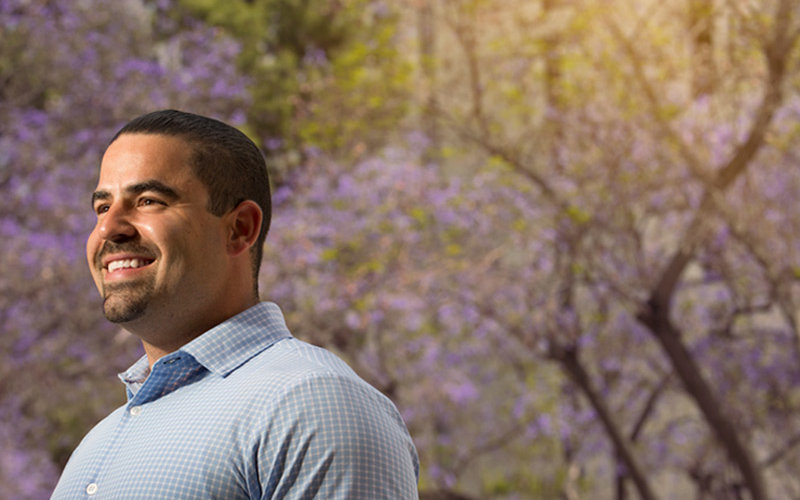
Nicholas R. Lazzareschi, a Cal State Fullerton graduate student in counseling, is one of only 30 students honored this year with a National Board for Certified Counselors Minority Fellowship.
Lazzareschi will receive an $8,000 award, as well as mentorship, training and opportunities to attend professional conferences. “I am grateful for the opportunities that this fellowship provides in enhancing the education I am receiving here at Cal State Fullerton.
“The graduate counseling program at Cal State Fullerton is a solid, strength-based program that is preparing me to serve to my proposed client base, as well as for future research opportunities at the Ph.D. level,” adds Lazzareschi, who has been conducting research with Matthew Englar-Carlson, professor of counseling and co-director of the Center for Boys and Men.
“Nick wants to make a difference in the lives of others, and I see that as being clearly integrated into his role as a clinician and his scholarly work as a researcher,” says Englar-Carlson. “His desire to help comes from a genuine place.”
Leah Brew, chair and professor of counseling, agrees. “Nick is professional, responsible and eager to learn. He works hard to learn the material in class, rather than being focused on grades,” she notes. “He’s passionate about research and about serving clients who come from disadvantaged backgrounds. He demonstrates a wonderful balance of compassion, self-awareness and intelligence.”
As a researcher/scholar, “Nick is interested in exploring effective substance abuse counseling with men. Though men are overrepresented in the chemically dependent population, there is surprisingly very little research about substance abuse counseling specific to men,” explains Englar-Carlson. “Nick is specifically focused on investigating strength-based approaches with men, which again is an under-researched approach.”
Lazzareschi is currently working on a 50-minute presentation on male-sensitive approaches to addiction counseling that he will present at the upcoming Western Association for Counseling Education and Supervision conference in November.
“There is not enough research with clinical utility to address gender norms when treating clients with substance abuse issues,” says Lazzareschi. “This will need to be researched on a general level and then further researched within various ethnic groups to target differences and integrate cultural norms to best serve underrepresented (in the literature) adolescent groups.”
After earning his master’s degree, Lazzareschi hopes to work with ethnic minority youth that have become involved with the juvenile justice system.
The goal of the NBCC Minority Fellowship Program-Youth is to reduce health disparities and improve behavioral health care outcomes for racially and ethnically diverse populations by increasing the number of available culturally competent behavioral health professionals.